‘We had little choice’: volunteers clear up after German floods
Two months after 133 people died in the Ahr valley, residents say they feel abandoned by politicians
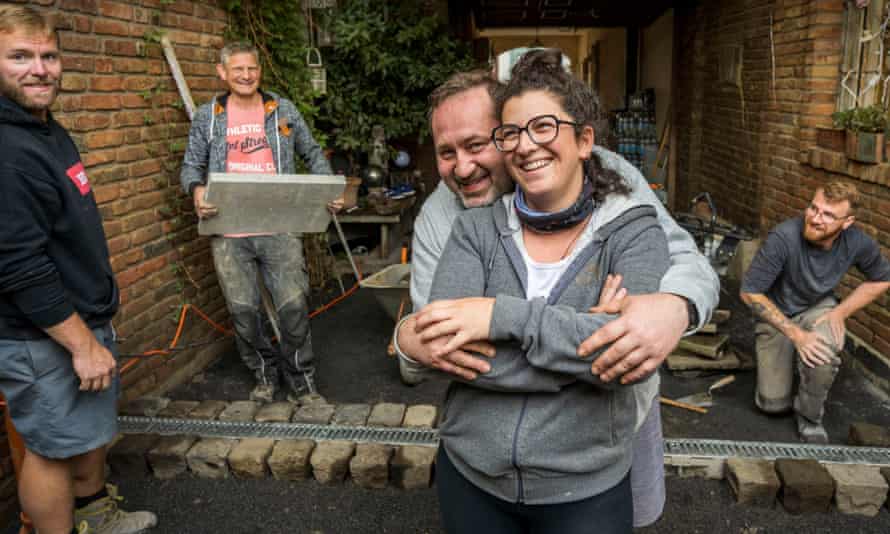
When she heard on the radio just weeks after floods had devastated her family-run restaurant and her home town that German authorities no longer classed it as a disaster zone, Paddy Amanatidis felt like she had been punched in the stomach.
“It’s hard to be told that everything is supposedly OK when you have no electricity, no clean water, no heating,” she said.
It is now almost two months since western Germany experienced catastrophic flooding as a torrential downpour saw the river Ahr, a tributary of the Rhine, rise by seven metres and envelop everything in its path as it spread far beyond its banks. At least 133 died in the Ahr valley alone, and about 50 more elsewhere.
Amanatidis recently stood in the courtyard of her ruined Mediterranean restaurant, La Perla, in the town of Bad Neuenahr-Ahrweiler, coordinating efforts by the cook, waiters, friends and family to construct a new patio.
“For the time being we’re mixing concrete rather than pizza dough,” she joked. Over the past few weeks they have removed 40 tonnes of detritus from the restaurant. “Mud, sludge and rubble, full of faecal matter. I came out in a rash. I and my sister wept when we realised we couldn’t rescue the pizza oven that my father installed 40 years ago,” she said.
While the mud and water that even reached some rooftops has now largely been cleared, a desolate landscape remains. Buildings are reduced to grubby hollow shells, with their owners waiting to hear from the local construction office if they can be rebuilt or will have to be pulled down. Railway tracks are suspended like rope ladders where hillsides have slipped into the valley and huge rubbish tips dot the landscape. About 42,000 people have been affected, many of whom have lost their homes.
But across the region, the painstaking reconstruction operation is in full swing, the air thrumming with generators and dehumidifiers, the thud of jackhammers and mechanical diggers. A EUR30bn rescue fund was approved by the Bundestag this week and those who were uninsured, or inadequately so, are to receive 80% of the funding towards reconstruction costs.

“The slow process of recovery has begun,” said Heike Heideck, head of administration at the Ehrenwall’sche clinic for psychiatry and neurology, which was forced to evacuate its patients to the top floors on the night of the flood. But he says many Ahrweilers are dealing with the psychological effects. “Whenever it rains we all get a bit jittery,” he said. “Several of our staff are having to deal with the fact that they are now patients themselves, being treated for trauma.”
Amanatidis feels very much like she is living in a disaster zone. The heating is not due to come on until March, and she has to travel to her boyfriend’s in Bonn to have a shower.
As for the federal elections this month, or an opinion on what the political fallout from the biggest catastrophe Germany has faced since the end of the second world war might be, she had little to offer other than a shrug.
“I am in my own world right now,” she said. “I can’t do anything except live in the moment and focus on the hope of being able to gather the family on this patio again. The election is so not on my radar.”
The sentiment is widespread. Even the politicians seem to have little appetite.
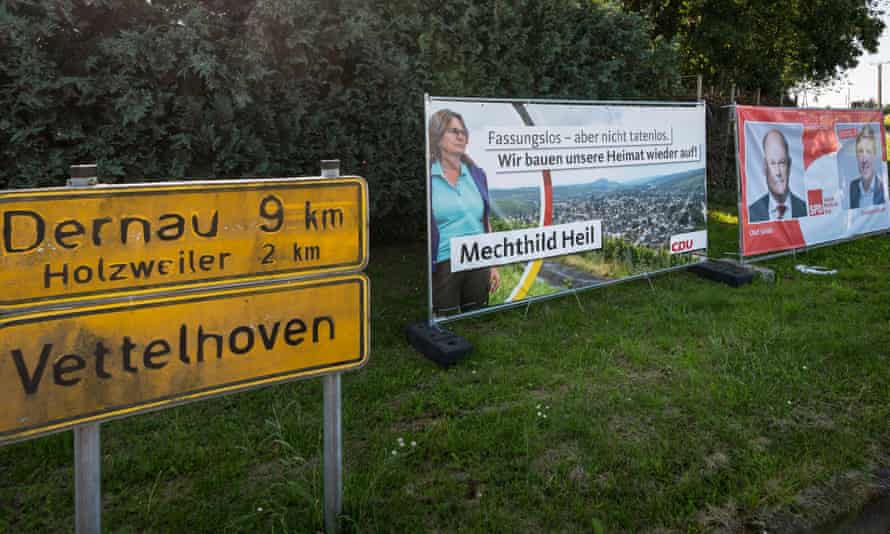
Mechthild Heil, the local MP for Ahrweiler and a member of the Christian Democrats, said in an interview outside her rubble-surrounded office: “No one is remotely interested in the election. People here need emergency aid, to know that the electricity and water supply is back on and is safe and reliable. They’re most afraid about a winter without heat.”
Many will be forced into alternative accommodation in the winter, and it is predicted that up to a third of them will never return.
Next to the remains of a brick bridge at Insul, one of 60 bridges out of 62 on the Ahr to have collapsed, Martin Schmitt, the Green party’s candidate in Ahrweiler, showed how the river had switched from the valley’s left side to the right, leaving several riverside houses in ruins.
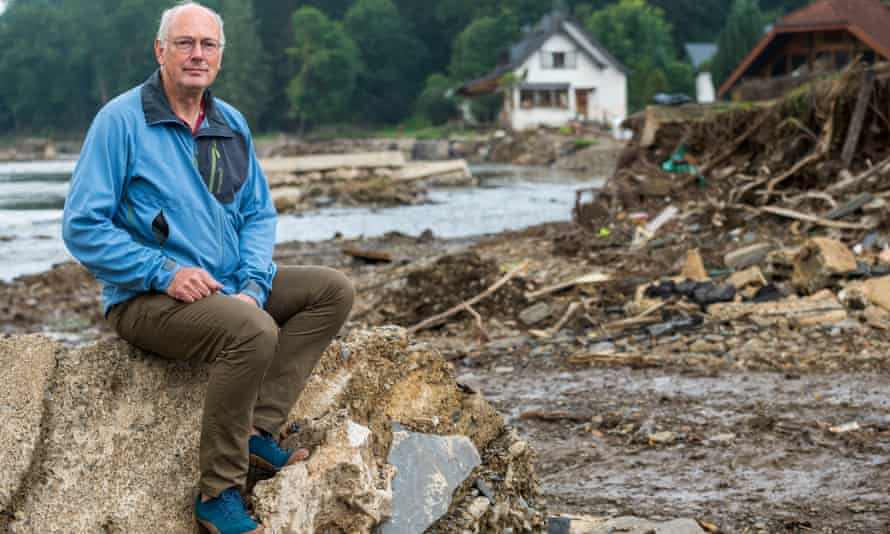
“There are mayors who have said ‘We’ll show that river’ and would like to redirect it back to its pre-flood route,” said Schmitt. “They still want to proceed with riverside housing developments, despite the clear evidence by experts that we need to completely rethink.
“I fear that even after this catastrophe we’re heading for the same old carry-on, building where we should not, not allowing nature its space.”
Despite widespread expectations that they were in a strong position to gain from the scale of a disaster that experts largely part put down to the climate crisis and woefully inadequate climate protection, the Greens are struggling painfully with the fact that there’s a fine line between showing empathy and appearing to exploit the disaster.
“We have a dilemma,” admitted Schmitt. “It’s not a very pleasant thing to say, ‘We were right’, to see that what we have been warning for 30 years is now coming true.
“And I can hardly go through town with a megaphone, putting up election posters. The best I can do in this situation – the election could hardly be more remote to most people here – is to show my face, talk to people, put them in touch with each other and mediate between someone I know who has a dehumidifier and someone I meet who needs one.”
It is this sort of hands-on direct action and solidarity which Ahrtalers say is keeping them going: a creative, spirited approach to the uphill task of bringing back some semblance of normality.
On the fields next to the Haribo sweet factory in Grafschaft, volunteers have set up a sprawling camp where cooks, medics and trauma counsellors provide a round-the-clock service.
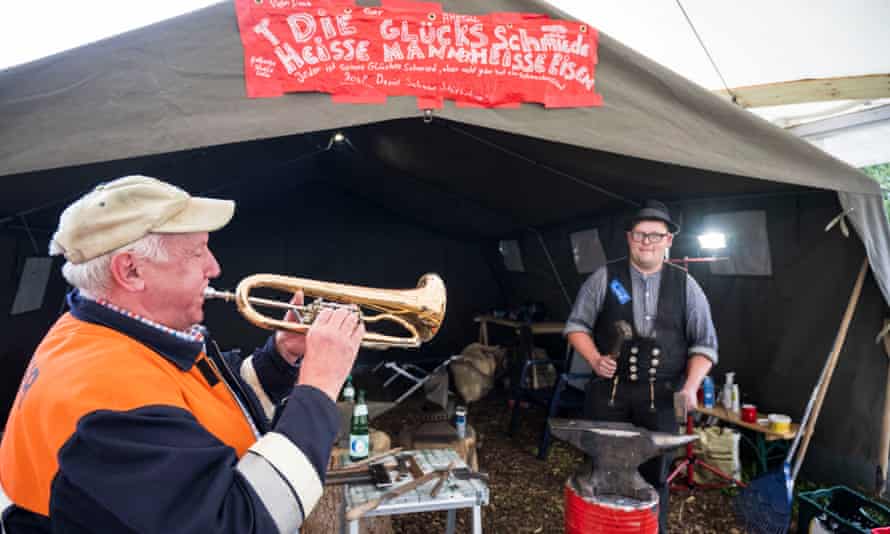
David Muller, a young blacksmith from Central Franconia, is on hand to sharpen the chisels vital to the recovery effort. The previous evening he managed 350, he said, working until 2.30am. He has been joined by Franz Josef Graf, a trumpeter from Bavaria, who accompanies him with his rendition of the Anvil Polka. Graf, who sees himself as something of a musical therapist, has found a position on the hillside from where his tunes – from Amazing Grace to Leonard Cohen’s Hallelujah – reach the whole valley. “I’ve held grown men in my arms who have been reduced to tears,” he said. “I’ve also never felt more useful in my life.”
Software developed by an events organiser facilitates the efficient distribution of helpers according to where they are needed most, everything from the demolition or reconstruction of family homes to clearing up one of many local vineyards to scouring debris out of school buildings.
“We had little choice other than to take things into our own hands and organise ourselves, as things were otherwise happening too slowly, too inflexibly, or not at all,” said Thomas Putz, whose orthopaedics business was hit by the floods and is now coordinating a privately organised volunteer effort of more than 100,000 helpers.
He said had made a deliberate effort to keep politics out of the relief effort after attempts by groups including the far right and Covid sceptics to infiltrate the ranks.
“I thank everyone when they arrive, telling them they’re the best, but also stressing we do not want any influencers or people who are here to further their own political interests. We need to get this valley out of the mess it’s in and that includes filtering it to keep out those that have no place here.”
His message politely extends to elected politicians as well, he said.
Armin Laschet, the candidate for chancellor from Angela Merkel’s party and her preferred successor, has contributed to the backlash after he was caught on camera laughing at a joke in a flood-stricken town while Germany’s president was delivering a solemn speech. It is repeatedly referred to locally and could yet cost Laschet the election.
“It’s fine if they come to gather their own impressions,” Putz said. “But I politely tell them that we want to be left to get on with the job.”
At the rubbish dump, Marcus Zintel, a building constructor from St Ingbert, 210 km away, who arrived as a volunteer days after the flood struck, said tensions on the site were running high. “We’re often confronting political influencers who come here with their drone cameras and argue on camera that the sheer amount of waste here proves that the authorities are doing nothing, when it merely reflects the scale of the disaster,” he said. “When we arrive first thing every morning, the site is already full again.”
He said that the climate crisis was a rarely discussed topic. “Strangely, people prefer to say it’s the state that has failed and that we need to straighten the river back to its pre-flood course, to get things back to how they were. The idea is absurd.”
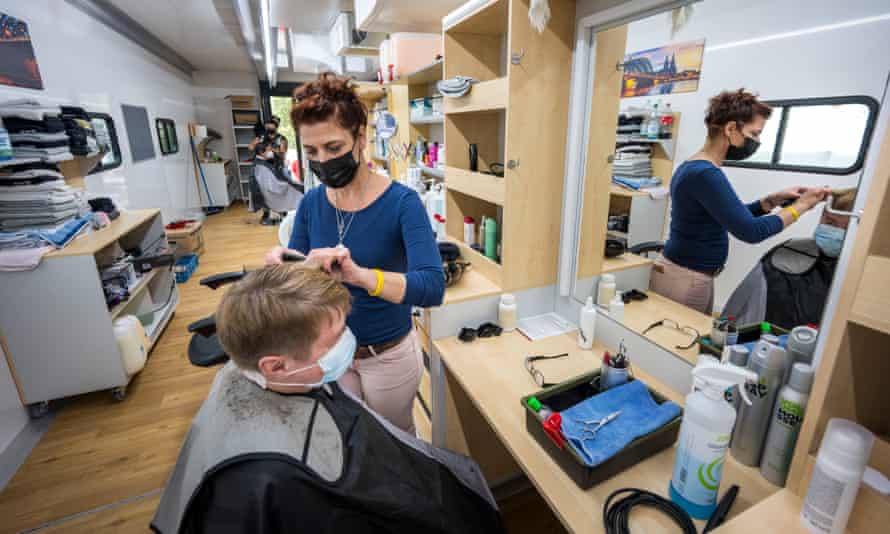
In a trailer in a Bad Neuenahr-Ahrweiler car park, Silke Wolf, a voluntary hairdresser with the association Barber Angels, was busy snipping. She said that although she intended to vote, she might yet ruin her ballot paper, as the election was “like choosing between cholera and the plague”. She had no trust in any of the parties, least of all the Greens.
“It does not feel like the Greens have grasped the big picture. It will take more than an electric car – which I can’t afford anyway – to sort out the mess we’re in,” she said. “Whether coronavirus or the floods, the universe has given us a kick up the backside and it’s about time those in power recognised that.”
